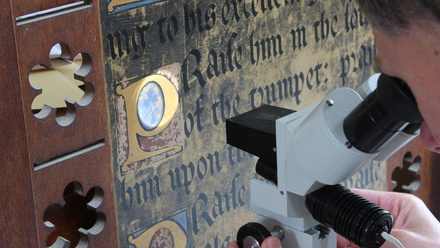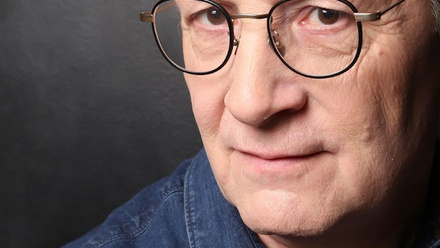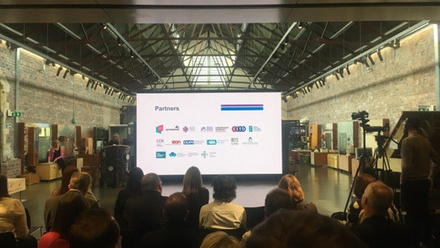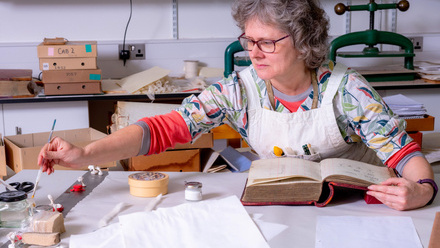Towards the end of 2019 Icon appointed two new co-opted trustees (James Murphy and Martin Kirke) to Icon’s Board of Trustees.
Icon first welcomed co-opted trustees onto the Board some years ago and we remain committed to the principle of maintaining a Board that has a mix of voices and viewpoints. While it is hugely important to ensure that conservators from across the spectrum of disciplines are represented on the Board, and that these individuals encompass the range of professional experience, their insights and ideas need to be balanced with input from people with a personal or professional background in other sectors. This is how our co-opted trustees add value to what we do. In some cases, they bring specialist skills and knowledge, such as legal expertise or marketing, but in many ways it is their fresh perspectives and different experience and understanding that are most useful to the Board as it carries out its decision-making. As cultural heritage professionals we may sometimes be too close to the issues to see the way forward clearly or to allow ourselves to take a step back and think strategically. Co-opted trustees offer a welcome counterpoint in this respect.
However, recruiting new co-opted trustees can feel like a bit of a risk. Do people outside of our sector really care about cultural heritage? Will anyone be interested in Icon and want to get involved in what we do? What if no one applies? Happily, any fears that our advertisements would fail to generate interest were swiftly allayed, first by a flurry of prospective applicants asking to have a chat with me about the role and, secondly, by their subsequent applications. Received 16 strong applications is a testament to Icon’s good standing in the not-for-profit sector, our professional approach to the way the organisation is governed and run, and, more significantly, the importance of what we do. This last point is crucial, as we are committed to recruiting trustees who understand why cultural heritage matters and who can demonstrate a genuine enthusiasm for Icon’s aims and objectives.
In order to probe their understanding of Icon we asked the shortlisted candidates to share their thoughts about the value of Icon with the interview panel. Having been inspired and uplifted by the responses we received I thought that I would share their insights in this article.
The prospective new trustees told us that Icon is valued for the following reasons:
Leadership: Icon’s focus on the practical conservation of cultural heritage sets us apart from other bodies and means that the organisation is fulfilling a unique and important function. Icon is a valued and respected leader in the cultural heritage sector with the ability to provide thought-leadership through the research that it carries out and the policies that it creates.
Champion of professional standards: The Code of Conduct and the Professional Standards that underpin accreditation provide a mechanism for members to demonstrate their professional skills and expertise. Icon works hard to demonstrate the value of accreditation to members of the public and other commissioners, and Icon Accredited Conservator status is a mark of achievement that members can justly be proud of attaining.
Advocacy: With the support of Icon’s Policy Advisory Panel our Policy Officer is able to demonstrate Icon’s impact to a variety of stakeholders including Government, policymakers, funders and the public. Icon is therefore a strong voice for the profession on the national (and international) stage, bringing together the views and concerns of a broad spectrum of disciplines to create a unified and powerful message. When Icon raises concerns or offers advice we have evidence that shows that people listen.
Profile raising: Icon continually promotes the value of cultural heritage and the important work that conservators undertake via a range of outlets including the Icon website, social media, the Conservation Register and through outward-facing talks and events. Icon argues passionately for the vital role that conservators play in ensuring that cultural heritage is properly cared for and conserved so that it can be enjoyed by future generations.
Knowledge sharing: Through the triennial conference, ACR conference and the huge range of events delivered through the Groups and Networks Icon helps to share knowledge, new ideas and inspiration across and beyond the profession. This knowledge sharing activity is supported by the publication of informative and well-researched articles in Icon News and the Journal of Conservation.
Convening power: Icon brings together conservation professionals from an incredibly diverse range of specialisms and types of practice; this allows us to generate impact through our strength in numbers and through the richness of our members’ experience. Icon is also able to bring conservators and others together to tackle issues of shared concern as well as actively supporting cross-disciplinary working and collaboration.
Sense of belonging: Icon’s Groups and Networks provide much more than just CPD opportunities for members. They offer a place to network, to build personal relationships and to establish working partnerships. They also help to foster a sense of belonging as well as offering support and encouragement to members. This is especially important when large numbers of conservators work alone, in micro-businesses or in small practices.
It was also heartening to discover that the candidates had a good appreciation of Icon’s dual nature, being both a membership organisation and also a charity that is required to deliver public benefit. They recognised that this can sometimes bring challenges, but were clear that the unifying factor is our passionate commitment to caring for our cultural heritage. As our vision states, Icon strives to ensure that cultural heritage is valued and accessible and that its future is enhanced and safeguarded by excellence in conservation. We can serve this aim and deliver public benefit by focusing our efforts on supporting the conservation profession. And, by supporting the profession, we will enhance public knowledge of conservation and the value of conservators, which untimely supports the professionals.




